|
|
|
Sort Order |
|
|
|
Items / Page
|
|
|
|
|
|
|
| Srl | Item |
| 1 |
ID:
159828
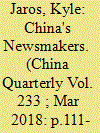

|
|
|
|
|
| Summary/Abstract |
Xi Jinping's rise to power in late 2012 brought immediate political realignments in China, but the extent of these shifts has remained unclear. In this paper, we evaluate whether the perceived changes associated with Xi Jinping's ascent – increased personalization of power, centralization of authority, Party dominance and anti-Western sentiment – were reflected in the content of provincial-level official media. As past research makes clear, media in China have strong signalling functions, and media coverage patterns can reveal which actors are up and down in politics. Applying innovations in automated text analysis to nearly two million newspaper articles published between 2011 and 2014, we identify and tabulate the individuals and organizations appearing in official media coverage in order to help characterize political shifts in the early years of Xi Jinping's leadership. We find substantively mixed and regionally varied trends in the media coverage of political actors, qualifying the prevailing picture of China's “new normal.” Provincial media coverage reflects increases in the personalization and centralization of political authority, but we find a drop in the media profile of Party organizations and see uneven declines in the media profile of foreign actors. More generally, we highlight marked variation across provinces in coverage trends.
|
|
|
|
|
|
|
|
|
|
|
|
|
|
|
|
| 2 |
ID:
138837


|
|
|
|
|
| Summary/Abstract |
Reporting bias – the media’s tendency to systematically underreport or overreport certain types of events – is a persistent problem for participants and observers of armed conflict. We argue that the nature of reporting bias depends on how news organizations navigate the political context in which they are based. Where government pressure on the media is limited – in democratic regimes – the scope of reporting should reflect conventional media preferences toward novel, large-scale, dramatic developments that challenge the conventional wisdom and highlight the unsustainability of the status quo. Where political constraints on reporting are more onerous – in non-democratic regimes – the more conservative preferences of the state will drive the scope of coverage, emphasizing the legitimacy and inevitability of the prevailing order. We test these propositions using new data on protest and political violence during the 2011 Libyan uprising and daily newspaper coverage of the Arab Spring from 113 countries. We uncover evidence of a status-quo media bias in non-democratic states, and a revisionist bias in democratic states. Media coverage in non-democracies underreported protests and nonviolent collective action by regime opponents, largely ignored government atrocities, and overreported those caused by rebels. We find the opposite patterns in democratic states.
|
|
|
|
|
|
|
|
|
|
|
|
|
|
|
|
| 3 |
ID:
186565
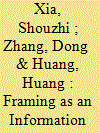

|
|
|
|
|
| Summary/Abstract |
How can authoritarian regimes effectively control information to maintain regime legitimacy in times of crisis? We argue that media framing constitutes a subtle and sophisticated information control strategy in authoritarian regimes and plays a critical role in steering public opinion and cultivating an image of competent government during a tremendous crisis. Using structural topic models (STM), we conduct a textual analysis of more than 4,600 news reports produced by seven Chinese media outlets during the COVID-19 pandemic. We find that Chinese media, instructed by the propaganda authorities, used a heroism frame to feature frontline medics’ sacrifices when saving others in need and resorted to a contrast frame to highlight the poor performance of the United States in the fight against COVID-19. We also show that both state and commercial media outlets used these two frames, though the tone of commercial media coverage was generally more moderate than the state media version.
|
|
|
|
|
|
|
|
|
|
|
|
|
|
|
|
| 4 |
ID:
180191
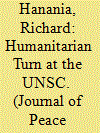

|
|
|
|
|
| Summary/Abstract |
The UN Security Council (UNSC) has transformed from a body almost exclusively focused on conflict to one that addresses a wide variety of issues. Despite a series of powerful works in recent years showing how international norms have developed over time, we still lack clear understanding of why and when international institutions change their missions. This article argues that while international politics is usually characterized by inertia, shocks to the system, or focal point events, can compel rational actors to adopt new logics of appropriateness. Since 1945, the end of the Cold War and the signing of the Helsinki Accords stand out as such events. Through latent Dirichlet allocation, a machine learning algorithm used to classify text, UNSC resolutions between 1946 and 2017 can be divided into the subjects of War, Punitive, and Humanitarian. The topic Humanitarian exploded in frequency after the Cold War, and more refined models show that words related to human rights and elections similarly increased after Helsinki. These changes are rapid and occur in almost the immediate aftermath of focal point events, showing their importance for norm diffusion. The analysis also reveals another shift towards humanitarian topics in the mid-2000s, demonstrating the ability of topic modeling to uncover changes that have been missed by earlier kinds of analysis.
|
|
|
|
|
|
|
|
|
|
|
|
|
|
|
|
| 5 |
ID:
192188
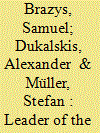

|
|
|
|
|
| Summary/Abstract |
This research report measures changes in China's public diplomacy after a May 2021 collective study session of the Chinese Communist Party Politburo. The session examined the country's global communications strategy and fuelled speculation about what might change in China's external communications, particularly with regard to its “wolf warrior” diplomats. Combining hand-coding and quantitative text analysis, we develop and validate a measure of “wolf warrior diplomacy” rhetoric and apply it to over 200,000 tweets from nearly 200 institutional, media and diplomatic Twitter accounts. Using a difference-in-difference research design, we evaluate if the session led to a noticeable change in the tweets of diplomats based in OECD countries. After the announcement, PRC diplomats in the OECD moderated their tweets in comparison to non-OECD diplomats, but we do not detect a major re-orientation of PRC communication strategies. These findings have relevance for scholars of Chinese foreign policy, nationalism and public diplomacy.
|
|
|
|
|
|
|
|
|
|
|
|
|
|
|
|
| 6 |
ID:
169329
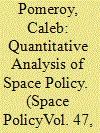

|
|
|
|
|
| Summary/Abstract |
Decades of space policy research have yielded an eclectic, multidisciplinary research agenda replete with findings that are relevant for theory and policy. Absent from the literature, however, is a systematic review and discussion of the data and research methods used to ascertain these findings. This is important for research progress because data and method choice have implications for the validity of the findings, potential contributions to theory, and efficacy of suggested policy prescriptions. Motivated by advances in computational social science, this article reviews the quantitative space policy literature and finds scope for further development with respect to data sources, method selection, and substantive topics of inquiry. Given these findings, two methodological areas are introduced, namely text and network analysis, and their utility is illustrated through an extension of a previous public opinion study, as well as a novel application regarding state support for international space law. This review might be relevant to scholars and practitioners interested in the empirical study of space policy.
|
|
|
|
|
|
|
|
|
|
|
|
|
|
|
|
|
|
|
|
|